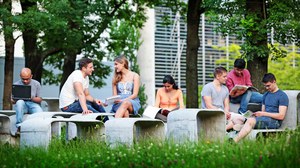Studieren an der Professur für Verkehrsprozessautomatisierung
Wir bilden Studierende in der Studienrichtung „Verkehrstelematik“ aus. Im Mittelpunkt der Lehre stehen zum einen wissenschaftlich anspruchsvolle Lehrveranstaltungen. Diese werden beispielsweise in der Verkehrsprozessautomatisierung mit ihren modernen Instrumenten der Optimierung, in der optimale Steuerung, verbunden mit den Methoden zur Entscheidungsfindung sowie in der Straßenverkehrssteuerungstechnik vermittelt. Zum anderen werden diese ergänzt durch anwendungsorientierte Vorlesungen, Praktika und Fachexkursionen, die den multimodalen Ansatz, der in der Professur verfolgt wird, widerspiegeln.
 © Amac Garbe
© Amac Garbe
Studieren an der Professur für Verkehrsprozessautomatisierung
Die Ausbildung erfolgt nach den Grundsätzen unseres Leitbildes.
Wir bilden zukunftsorientiert nach den neuesten Erkenntnissen von Wissenschaft und Technik aus.
Wir lehren mit dem Schwerpunkt Regelungstechnik universelle Konzepte und Methoden, die auch in 50 Jahren noch Bestand haben werden, binden jedoch auch moderne Verfahren und aktuelle Erkenntnisse in die Lehrveranstaltungen ein. Moderne Lehrmethoden und Erkenntnisse der Didaktik fließen dabei in die Wissensvermittlung ein. Insbesondere legen wir Wert darauf, selbsttätiges Lernen zu ermöglichen und Studierende zu kritischem Denken und verantwortlichem Handeln anzuregen.
Wir schaffen eine solide theoretische Basis.
Regelungstechnik wird an unserer Professur großgeschrieben und bildet den roten Faden unserer Ausbildung sowohl in den Grundlagen als auch der Vertiefungsrichtung. Die so erworbenen profunden Kenntnisse in Systemtheorie und Regelung ermöglichen es unsere Absolventinnen und Absolventen, komplexe Systemzusammenhänge zu verstehen, zu modellieren und in ihrem Sinne zu beeinflussen. Strukturierte, sorgfältige Arbeitsweisen werden ebenso erlernt wie Präsentationstechniken. Diese Fertigkeiten bieten eine gute Grundlage für ein effizientes Problemlösen und ein erfolgreiches Auftreten in Industrie und Forschung.
Wir fördern problemlösendes Denken und vermitteln Wissen anhand von aktuellen Forschungs- und Entwicklungsprojekten.
Seit 2006 wurden nahezu 100 Forschungs- und Entwicklungsprojekte und -aufträge (Drittmittelprojekte) bearbeitet, deren Ergebnisse und Erkenntnisse in die Lehre einfließen.
Beispielsweise wird das Verkehrsmanagementsystem VAMOS für den Großraum Dresden von den Beschäftigten der Professur entwickelt und betreut. Unsere aktuellen Projekte zur Elektromobilität beschäftigen sich insbesondere mit der Bereitstellung von Informationen zur Umsetzung energiesparender Fahrweisen im Straßenverkehr. Dazu gehören Grünzeitprognosen verkehrsabhängig geschalteter Lichtsignalanlagen, Rückstaulängenschätzungen und ein energieeffizientes Routing. Einen weiteren Forschungsschwerpunkt bilden die Fahrerassistenzsysteme zur Realisierung energiesparender Fahrweisen im Eisenbahnbereich. Verbunden mit Verfahren zum operativen Verkehrsmanagement sind damit nennenswerte Energieeinsparungen nachweisbar.
Zudem werden, neben der Vermittlung von Praktika und industriegetriebenen Diplomarbeitsthemen, Studierende - wenn gewünscht - anhand von Projekt- oder Studien- und Diplomarbeiten in die aktuelle Projektarbeit einbezogen.
Wir pflegen Kontakte zu unseren Absolventinnen und Absolventen.
Auch nach der Diplomarbeit stehen wir unseren Absolventinnen und Absolventen mit Rat und Tat zur Seite. Wir vermitteln Kontakte zu Partnern, die interessante Einsteigerjobs anbieten, unterstützen bei der Bewerbung in Preisverleihungen für Abschlussarbeiten und bleiben ihnen auch während des Arbeitslebens verbunden. Gemeinsame Projekte, Veranstaltungen und Konferenzen bieten immer wieder Anlass für ein Zusammentreffen.





